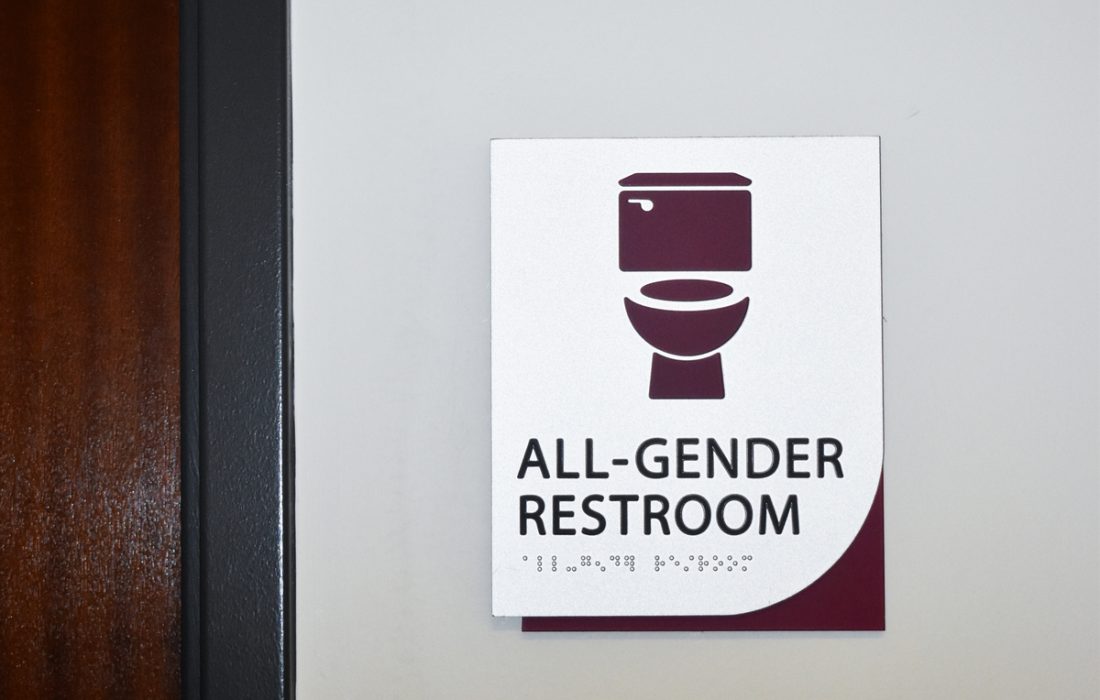Writer Sophie Buchman implores Loyola to make resources more accessible and to proudly fight for its transgender students.
Now is the Time for Loyola to Fight for its Transgender Students
Last Tuesday, like many other Ramblers, I tuned in to watch Vice President Kamala Harris debate former President Donald Trump.
While I knew going into the event a spectacle would ensue, I was still absolutely floored when the former leader of the free world made a crazed statement about Harris’ supposed liberal agenda.
“Now she wants to do transgender operations on illegal aliens that are in prison,” Trump said.
After picking my jaw up off the floor, I was perplexed as to how anyone could make such an unhinged comment in front of the entire nation.
And then, remembering I didn’t just fall out of a coconut tree, I recalled the context in which this statement exists.
Just this year alone, 652 bills aimed at curbing the rights of transgender and gender non-conforming people were introduced in legislatures across the nation, according to the Trans Legislation Tracker. This includes 79 bills at the federal level — the most in the history of the U.S. This is happening while the 75 anti-LGBTQ bills passed in 2023 enter their eighth month of enforcement.
Many of these bills have been pushed by Trump allies such as North Dakota Governor Doug Burgum and Missouri Governor Mike Parsons. Both Burgum and Parsons signed bills into law which criminalized life-saving gender affirming treatments for trans youth. Trump himself has pledged to protect children from “left-wing gender insanity,” if elected this year.
With anti-trans rhetoric dominating major policy proposals, now is the time for educational institutions like Loyola to step up and advocate fervently for their transgender students.
Currently Loyola does a decent job accommodating its transgender students. Student facing institutional offices such as the Center for Diversity and Inclusion do an excellent job at advocating for transgender students, offering programs and resources aimed to uplift the transgender population.
The Wellness Center also offers a helpful assortment of off-campus, community-based resources for transgender students, however only one medical resource is listed, which isn’t nearly enough to address the complex needs of transgender healthcare.
Along with the Wellness Center and CDI, student-led groups like Rainbow Connection and the Student Government of Loyola Chicago have been forerunners in promoting equity for transgender students on campus.
Yet despite these groups’ best efforts, issues concerning transgender students tend to get swept under the rug.
A simple online search inquiring about Loyola’s gender inclusive housing yields confusing results. And, although student preference regarding gender inclusive housing is included on Loyola’s student housing application, the Department of Residence Life makes no mention of this resource on their website.
One of the largest issues facing the transgender community on campus — specifically students who identify as non-binary — is the lack of access to gender-neutral toilets and facilities. In 2022 there were 28 total gender-neutral restrooms on both the Lake Shore and Water Tower campuses, the Phoenix previously reported.
However, the actual number of accessible facilities becomes unclear upon doing further research. The CDI website lists the location of 27 “unisex” facilities on both LSC and WTC.
To add more confusion, a press release from the Facilities Department links three documents with a total of 106 gender-neutral bathrooms listed across all three of Loyola’s campuses. This conflicting information indicates even the university is unsure of what resources it has for trans and non-binary students, perplexing prospective and current trans and non-binary students alike.
Menstrual products are often understocked in these facilities, as well as in men’s restrooms on campus.
Although Loyola is making some efforts, it’s time for Loyola to take its transgender and non-binary inclusion efforts to the next level.
There is a very hidden and confusing “Don’t Ask Don’t Tell”-esque nature surrounding Loyola’s transgender and non-binary equity efforts. It’s not clear where this sentiment comes from, and it’s disheartening resources people depend on are glazed over or not mentioned at all by the campus community.
As anti-trans rhetoric fuels our political landscape, the time has come for Loyola to come out of hiding and follow-through on actions and promote resources for transgender students and faculty alike.
Just sharing names and pronouns in class isn’t enough to be inclusive anymore. Inclusivity comes from active engagement with the trans community on campus, clarity surrounding resources, consistently updating and reevaluating resources and taking active stances on issues affecting the transgender community.
Inclusivity comes from recognizing the uniqueness of the transgender experience and actively encouraging students to feel safe sharing their lived experience with their cisgender peers. Inclusivity comes from vocally protecting the rights of transgender students on campus.
Loyola should be proud of its transgender population and transgender students deserve to be proud to be at Loyola. While political movements try to legislate trans people out of existence, it’s the fundamental responsibility of the university to uplift transgender voices so they can educate others on their existence.
Topics
Get the Loyola Phoenix newsletter straight to your inbox!



